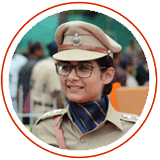Manjari Jaruhar

Manjari Jaruhar

Anahita Speaker Series
CARNEGIE INDIA VEDICA INITATIVE
Creating an Effective Female Police Force
As women's safety continues to be a pressing concern for India, addressing issues of law and order is key to creating safer environments for women. Recent government data highlights that women comprise less than 10 percent of India's total police force. Without effective policing structures and capabilities, cases against those who commit violence against women are harder to resolve.
In the second Anahita Speaker Series session of 2020, Manjari Jaruhar drew on over three decades of experience in the Indian Police Service to decode how we can create an effective women police force.
Discussion Highlights
- Systemic Challenges: Participants discussed the various challenges that women face in the police force. They noted that while men and women in the police have to pass the same rigorous trainings and standards, women are often assigned administrative jobs, while men are given field jobs. Field jobs require officers to be physically fit, tough, and able to work long hours under pressure, qualities typically attributed to men, they noted. Participants highlighted a skewed perception within the police force that women are less likely to work long hours and are not physically and mentally capable of handling field postings. Such biased perceptions of women can hinder their participation and make it difficult for them to advance in the police force, explained participants. They also noted, one way in which women have broken these perceptions, is by excelling at their duties, thus demonstrating to their male counterparts and the larger system that they can carry out their police duties as well as their male counterparts.
- Importance of Women in the Police Force: Participants observed that police stations with women officers at the helm see a higher number of crimes reported. Participants agreed that women continue to remain hesitant while reporting crimes, due to the fear of being mistreated or judged unfairly by police officers. Participants suggested that one way to increase women reporting crimes is to increase the percentage of women in administrative roles. As law enforcement roles are changing, participants emphasised the need for training women officers in soft skills. For example, previously Central Industrial Security Force (CISF) officers were only deployed in hazardous industries, and in remote and difficult locations, whereas now they play an active role in administrative roles at airports, metro stations, and government offices, they stated.
- Need for Representation: Participants noted that while the Indian government mandates thirty-three percent of reservation for women at all levels of service, the Indian police force has yet to reach this level of representation. Participants deliberated that women have been discouraged from a career in the police services, as it is a profession that is often considered unsafe and challenging for women. Participants observed that gradually, there has been a change in people's mindsets as women officers excel in this field. Participants discussed the differences that exist in the experiences of women police officers in India and other conflict-ridden countries like Afghanistan. In Afghanistan, a challenge women police officers face is lack of respect from their male counterparts and the general public as it is socially unacceptable for women to work in male-dominated fields, they stated.
- Succeeding in the Police Force: Participants encouraged women in the police force to be aspirational and not give up when faced with challenges. They emphasized the need for women to have a support system of family, friends, and neighbours to help overcome obstacles. They elaborated on the crucial role played by mentors to help women succeed in the police force. They noted that due to the unfair treatment of women in the police force, women officers tend to ask for concessions like change in training patterns or change of postings etc. Some participants felt that while few concessions are necessary, too many can lead to women relying on concessions in order to do their job. Participants accepted that this feeds into the negative stereotype that women are incapable of doing the same jobs as their male counterparts. Participants highlighted the diverse experiences, perspectives, and skills that women police officers bring to each of their postings.




















